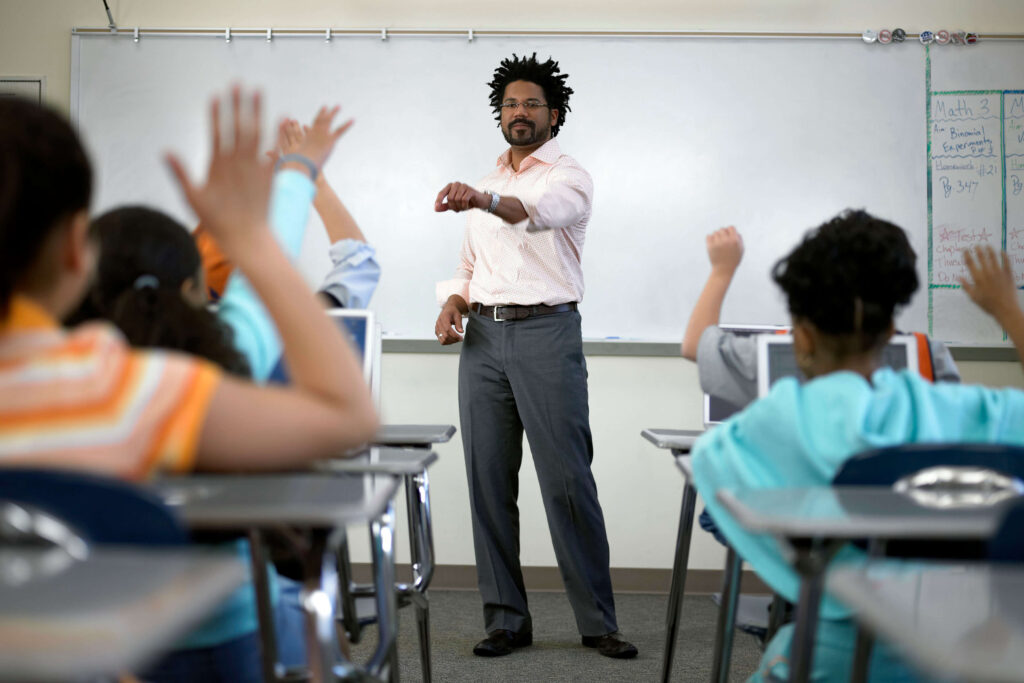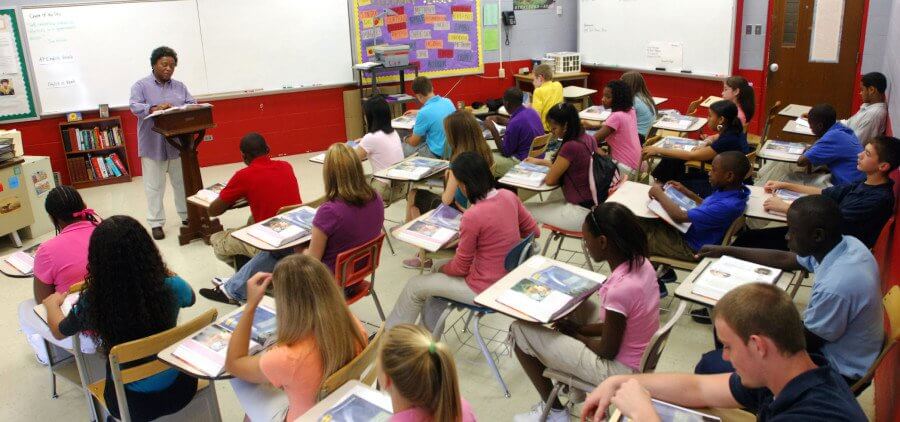Teacher interview questions and answers is something that has to be seriously considered by professional teachers seeking to relocate to the UK to work in schools as a school teacher. This is because all teachers are mandated to be interviewed before they can be offered jobs.
Related article: Moving to the UK as a teacher
Related article: Skilled worker visa UK: The fastest way to full residency in Europe
Even though teaching has the same level of significance as other career choices in the UK, the selection process for individuals who will embody this profession is quite rigorous, as teachers are seen as potters who are saddled with molding the next generation.
Thus, each separate teacher application needs to go through a series of stages ranging from the applying stage to the interview stage which is used to pinpoint quality of competence as well as efficiency before teachers from other countries can be employed by schools in the UK.
It is important to note that during teacher interviews, applicants will be asked targeted questions to determine if they are a perfect fit to be teachers in the United Kingdom.
In other to increase your chances of landing that dream teaching job in the UK, we have compiled a list of 15 teacher interview questions and answers that could be asked in your next interview. So that you can be ready with the right answers to boost your chances of moving to the UK.

Teacher Interview Questions And Answers
To be ready for your scheduled virtual or physical interview with the UK school you have applied to be considered for a teaching job in, we have prepared 15 frequently asked teacher interview questions and answers to get you ready, pumped up and answering confidently.
We recommend that you take out time to study the questions and their corresponding answers multiple times, not to memorize them, but to understand their significance and be ready with an expected response to them.
-
Why did you choose to be a teacher?
While contemplating answering this question, it is key to make an impression that communicates a passion for teaching. One that paints the applicant as a person who has always had an ambition to be a teacher.

It is important to show that teaching was always your first choice in choosing a profession and not a second choice. Thus, to answer this question, think about a person in your formative years that reinforced your desire to be a teacher.
Maybe due to the principles the person embodied which motivated you to follow in his/her footsteps. Try to avoid generic response such as; “I have always wanted to be a teacher”. Instead lead with;
“Mrs. Cheryl’s total commitment to making sure that her students gained practical life skills even though she was our biology teacher was the deciding factor for me as to why I chose this profession”.
-
I’d like to know a bit about you can you tell me a little bit about yourself.
Of all the teacher interview questions that are normally asked, this one is the most frequent. You can start by stating whether you are a certified teacher or not. Then the number of years you have been teaching for as well as what got you interested in this career path.
After which, you’ll begin dissecting your work history as a teacher, you know, the ones highlighted on your CV. Ensure that all dates and timeline match, because as you speak, your interviewer will have your CV at hand to make sure that everything correlates. Do your best to sell yourself the best way you can.

“I am a certified physics teacher with over a decade of experience. I got attracted to the teaching profession because of the passion to teach and tenacity on the face of limitations shown by my summer school math teacher, who was blind, but somehow found a way to be a genius in the subject. I have had the experience of teaching physics to 10th graders across 5 schools. My journey through teaching has had its ups and downs, but in every step of the way I have seen them all as opportunities to learn and better myself becoming a seasoned teacher. I hope I can be given the chance to bring my experience to bear in your prestigious school, I believe my knowledge and experience will be of immense benefit to your students”.
- Why do you want to work at our school?
This is one of the most frequently asked question during a teacher interview. It is usually the first or second in the list of questions. To give the right answer to this inquiry, applicants are expected to visit the website of the school whose interview they will be sitting for.
Find out their core competence; ‘what are they known for?’. Visit different online forum to read what current and past students of the school have to say about their experience schooling there. If classes are technically designed customize your response accordingly relating it to why you will be a good fit there.

While visiting their website and studying about the school, identify pertinent points such as their mission, purpose, the total ethos of the school which is usually captured in a statement, their value system, who do they cater for (demographics) and extracurricular activities. The best way to craft a response to this question is to begin with;
“in going through feedback left by your past students on Quora, I couldn’t help but notice the practical approach adopted by the school in designing their course curriculum such that knowledge gained becomes immediately applicable in the real work upon graduation. It’s no surprise that most students who graduate from Britney high school go on to study technical or research-based courses in the University. Such levels of practical detail in designing lesson plans fits right in with my core principles in teaching my students, I lean towards real life applications instead of just theorizing concepts. For instance……”
-
What experience do you have in schools?
It is worth remembering that when a position is advertised or listed on a school’s website, usually it comes with a list of areas in which the applying teacher has to have been experienced in over time. With this question, you simply have to go to town buttressing where you have these experiences.

If you have been teaching in one school, but for a number of years, highlight the level of experience garnered in that time. If you had taught across several schools itemize differences in experiences gained and how they shaped your perception of the teaching profession.
With this question, you have to seek to address schools listed in your work history itemized on your CV describing how experiences obtained in these schools matches with those required by the target school in the UK. You can attempt to answer this question by starting with;
“my experience at Powell high school was very transformational, having worked here as a biology teacher for over half a decade, I discovered that my students had more curricular skills than social skills, so outside the classroom, they found it difficult mixing with their peers from other classes. To change this, I increased the level of communication while in class, giving my students take home assignments, having them relate core biology topics such as digestion to real life scenarios and had them discuss their findings in class, then had other students ask questions on these findings, this built their individual confidence, making it possible for them to express themselves when not in class. However, at Presley international schools where I also taught as a biology teacher for 3 years, the reverse was the case…”

-
Can you evaluate the way your lessons are taught and how can you do better in the future?
This here is a critical question, which is capable of making or breaking your teacher interview. Question 4 aims at finding out whether you can stick to the guiding curricular structure of the school, also to know if you are open to continuous improvement.
It is important to be strategic in your response, try not to be too defensive when answering, talk less about yourself and more about your holistic approach to teaching. Highlight intangibles that make your classes go smoothly and limitations that hold them back.
Such as ensuring there is order in the sitting arrangement of your students. Point out that you make it a point of duty to know the names of all your students, so that when your lessons are in full swing, they are all addressed by name. You can phrase your response like;

“I rely heavily on the lesson plan handed to the teachers by the educational board through the principal of my school, however to facilitate my lessons, I use the flip learning methodology which ensures that my students study the lesson material ahead of their class with me. That way, we have an active session were everybody contributes and all difficulties experienced by the students in their preparation are ironed out. Although I must confess, I find it quite challenging to get the naughty students in my class to study the lesson materials before our classes begin, even when I get their parents involved. Recently though, I discovered that incentivizing them with rewards does work sometimes. This is of course after structuring their sitting arrangement such that the naught students are positioned in the front row directly before where I stand to deliver my lessons. That way they know my eyes are always on them”
-
If I walked into your classroom during an outstanding lesson, what would I see and hear?
Before you start answering this question, make it clear to your interviewer that inspectors from your country’s ministry of education occasionally come by to see how classes are moderated by teachers in the school you work.
Also in trying to answer this question, you must bear in mind that your questioner seeks to know your definition of a quality teaching session. This question aims at trying to gauge your passion for teaching. Limit your answer to at least 1 to 2 minutes no more. Structure your response this way;

“regular on-class inspection is something that happens across all state owned high schools in my country and ours is not an exception. If you were to walk in on one of my active classes, you will find an interactive session, were I give an indebt explanation of a concept, following it up with examples. While the whole time encouraging my students to ask questions that relates the subject matter to their lives on a personal level. It is common to see everybody talking at the same time, which I try to moderate by calling out the name of the person I want to speak first. I really love my students they make my task easy.”
-
Can you tell us about a behavior management strategy you have used to help engage an individual learner or group.
This question is designed to find out how you deal with naughty students in your class. In most African countries, the practice of flogging students is still a norm, do not mention this practice in your attempt to answer this question as it will automatically rule you out of the running for this position.

Give a verbal illustration of how you used an effective strategy to manage the disruptive behavior of certain students in your class. Explain the working principle that made you think this will work and the extent to which this management tactics worked in other situations. Respond this way;
“in my line of work as a teacher its common to find students who are different. Those who are interested in other things outside the class room. I try to use a hands-on approach with this category of students, first of all discussing their future plans and then occasional visiting them at home to have a chat with their parents about extracurricular activities that should be designed and supervised such that even though the student isn’t in class, when he/she takes part in it something educational is learnt, such as incorporating a game of monopoly during the weekends. Close proximity with the student and his/her parent has always worked in kick starting a turnaround in re-orienting the student while in class.”

-
Can you give an example of when a pupil refused to cooperate in class?
In planning for your teacher interview questions and answers, you must be mindful that number 7 usually has follow up questions, so you need to be prepared. Follow up questions such as;
- What did you do?
- How did your actions affect the situation?
- What would you do differently next time?
These questions are designed to get a sense of your mettle as a quality teacher. Do not start from the follow up question, instead begin from the parent question; “can you give an example of when a pupil refused to cooperate in class?”.
At this junction, you have to show how you go about smoothening out the wrinkles caused by difficult students in your class, using the follow up questions as pillars in which you use to support your points. End with how the troublesome student was re-integrated into lesson participation. You can lead with;

“by far one of my most difficult student was Philip Stuwani, he liked to sit at the back of the class and pick on the brilliant students, particularly when they make intelligent contributions during a class activity. My first line of action was to change his sitting position, I brought him to the front, then made sure that when it was time to solve an exercise in the class, he was the one who read it to the rest of the class and made the first suggestion. In event that he got it wrong, the class always went quiet, this made him feel awkward. I noticed that he began putting in more effort in his class work and developed a competitive streak, which led to less frivolous activities in class. Before then he complained to me on more than one occasion that he did not like his new sitting position, because it put him in the line of sight of everyone in the class, other teachers would have sought to do things differently, but since this method produced maximum result in dealing with difficult students, I stuck with it.”
-
What are the issues bedeviling the educational sector in most developed countries?
With this question, your response has to be factual, in otherwise, research into whatever you say must be able to show a body of work that has been properly documented. Do not pull answers from tin air, in a bid to please your questioner.

Questions like this are the reason why this teacher interview questions and answers article was put together by Fuse Chronicles, to give you a chance at success when answering questions at your next teacher job interview. You could phrase your answer like this;
“by far one of the biggest problems facing education the world over is the problem of funding. I mean 2 in 5 children in the UK are out of school, this has led to an upsurge in crime, because all that youthful energy has to be directed somewhere. This is not just a UK problem, the same problem is faced in countries like Canada, the United States and Australia. To solve the problem of funding for my department in the school I work for, I partnered with the creative art teacher and sampled paintings, poetry and music done by my students on our school website, getting an NGO to partnership with this initiative was how we were able to get the Melinda and Bill Gates foundation onboard and just like that funding which was a major problem for the school was solved. I plan on replicating this if the need ever arises in the future.”
-
Are you a flexible teacher? If so, explain how.
It’s important to show that you can bend over backward, but you also must be prepared to show that you have your limits. So, when asked this question, try not to oversell yourself to the point where you end up selling yourself short. When asked this question, respond by saying;

“my strength is contributing towards the actualization of the school’s goals and objectives in any way I can as an English/history/maths (depending on your field) teacher. However, I am open to learning other skill set that will help me become valuable to the organization in other areas that it sees fit”.
-
What is your classroom management Style and what plan will you adopt going forward?
During your teacher interview questions and answers virtual session you will be asked a question like this one, on classroom management. There are 4 types of classroom management styles; authoritarian, authoritative, permissive and indulgent.
Your classroom management plan has to be centered around incorporating all, one or a couple of them. It is vital that you know about the types of classroom management plans. This gives you credibility as a school teacher, showing your interviewer that you know what you are doing. Phrase your answer like;

“my classroom management style usually incorporates 3 different plans depending on the situation, I could be authoritative; when I have to assert myself, particularly when my students are acting unruly, however most of the time I adopt a permissive approach, which demands that my students communicate their desires to me, these can be declined or accepted depending on the severity of the situation. I am rarely indulgent, because most students take liberties when you over indulge them. There are however times when I make an exception to this rule. I plan on bringing this 3 classroom management styles with me if given the opportunity to become a chemistry teacher in your school”.
-
What do you do to accommodate a student with an IEP?
Individualized education plan is for children with learning disabilities or some form of disability that impairs learning. It is important to note that school teachers in the UK and in most tier 1 countries are required to get extra training to be able to teach a special child.

So, if you are not trained to teach with an individualized education plan, do not be afraid to say so during your interview. This will not affect your chances of landing the job in any way. Unless the position advertised is for teachers with IEP training. You can respond to this question by saying;
“I have never had to teach a student that requires an individualized education plan, this is because I have not had the privilege of teaching a special child before. However, if this was to ever happen in my line of work in your school, then I’ll liaise with the child’s parent and the school’s curricular officer to find the best approach that suits the child”.
-
Since you started teaching, what has been the most difficult aspect of the profession?
This teacher interview question is designed to test the depth of your teaching experience. Take a second to think it over before you respond. Recollect times, when you needed support from another teacher because of a student or group of students.

Or the time you had to reach out to parents of your students to lodge a complaint. These steps are important to give a quality answer to this question. Rushing in with an unprepared response will leave you open to being rejected. You can respond this way;
“by far my biggest challenge, was when I got accepted to Pierre D’gore international, to teach chemistry to 9th graders. 60% of the class spoke French and very little English. I, on the other hand didn’t speak any French. My first class was a disaster, because most of my students failed to understand anything I said. Even when I complained to my head of department, I was told there was nothing they could do, because the chemistry department was severely understaffed. I had to come up with a solution that could help solve this problem and this I did. I came up with a peer partnership program, which saw me pair a hardcore French speaker with another student who had a strong command of both languages. This worked a treat, because, during the lesson, I always ensure there were small breaks were both members had a team meeting to communicate what was learnt or class work that was given. Soon enough, the language barrier was eliminated”.

-
How would you motivate parents to become involved in the classroom and in the education of their children?
It is paramount to communicate your understanding of parental involvement in educational development of a child when you try to answer this question. Soliciting the support of parents is the best way to maintain performance levels in students.
There are a number of ways to answer this question, all of which must involve creative activities in which students embark on with their parents, while in the classroom and at home. This could range from playing educational games to take home assignments that should require parental input. Optimal response;
“I know for a fact that parental involvement in a child’s educational pursuit is one of the best ways to maintain performance levels. I usually have a quick talk twice everyday with parents when they drop off their child/children at school. During morning talks, I find out how the child fared while doing his/her take home assignment from the previous day and in the second talk, I communicate the nature of homework given and encourage the parent to go through the work with the child, this is done when he/she is being picked up from school in the afternoon”.

-
What will you do to modify your teaching to meet the needs of a gifted student?
With this interview question, your interviewer knows that you might not have the required experience to teach special students, but wants to know what you plan on doing about this deficiency. They are asking to know whether you are open to further training.
Not all teachers are interested in teaching gifted students, if you find this difficult, don’t hesitate to tell your interviewer that you find teaching special children particularly challenging and would not like to venture into this area if recruited by the school. You can phrase it this way;
“gifted children have special needs that must be custom made to suit their learning requirements. I have never taught a gifted child, but feel having to multitask between ensuring the well being of regular students and doubling back to special kids might be too much for me. While I am open to taking further training in this area to improve my teaching rendition across all learning levels, I try to streamline my lesson preparation for maximum efficiency”.

What’s Next After Your Teacher Interview Questions And Answers Stage?
The teacher interview stage will be done in person if the applicant is already in the UK, however if overseas, then it will be done virtually. As soon as this stage is out of the way, a job offer will be sent, this letter will contain the base salary amount that the applicant will be paid.
Depending on whether the applicant has a qualified teacher status or not, the contract period in which the employment will be valid for will be stated. Without QTS, it’s normally for 4 years and with QTS the contract could last till the statutory retirement age for the country.
When the job offer is accepted, an employment contract will be sent. This has to be signed and mailed back to the potential UK employer. A certificate of sponsorship (CoS) should be expected in less than a month, this is to be used to smoothen the UK skilled worker visa application process.

Conclusion
It is important for applicants who intend to immigrate to the UK, Canada, the United States or even Australia to prepare with the right teacher interview questions and answers in order to make a good impression in the presence of the interviewer.
This interview is usually booked when applicants have been moved on to the next stage in their application process to teach in the UK. To prepare for one, applicants should endeavor they master frequently asked questions to be equipped to excel past this stage.
Foreign or local teachers taking part in interviews should try to be confident, but above all should be honest, showing some personality while they answer questions put before them. Interviewers want to believe that hiring you to teach in their schools will maintain the levels or elevate it.
Upon successfully concluding the interview stage, a job offer is sent to the applicant, followed by an employment contract, after which a certificate of sponsorship is dispatched to help ease visa procurement.
Was this article helpful? Do you have questions? If you do leave them on our social media account and we’ll get back to you.











